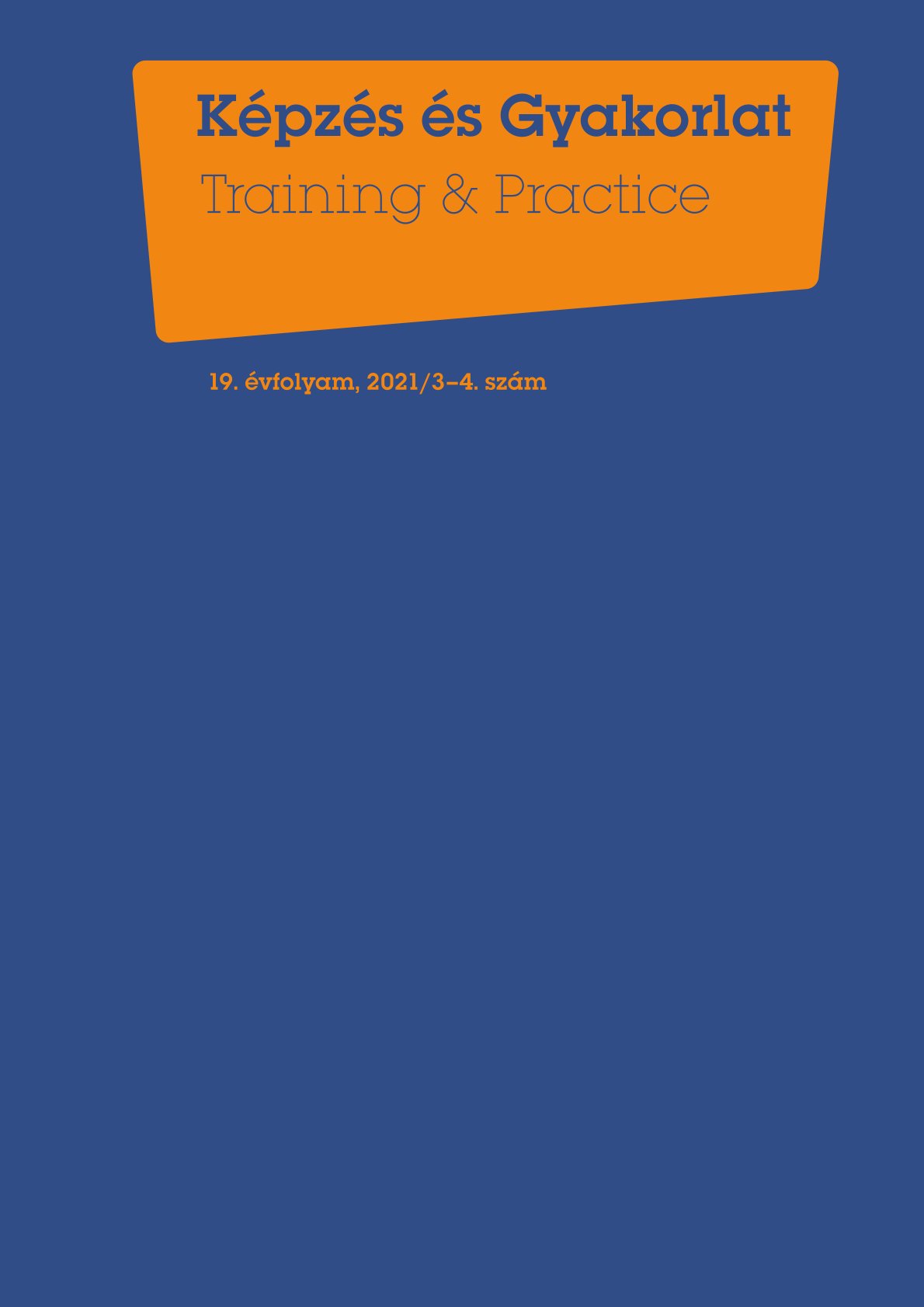A pályaérdeklődés három konstruktuma, amely segíti a gimnáziumi tanulók megismerését
DOI:
https://doi.org/10.17165/TP.2021.3-4.8Absztrakt
Magyarországon a rendszerváltozás idejétől újból hivatalosan is működhetnek az egyházi Jelen tanulmányban arra keressük a választ, a pályaérdeklődéssel, illetve annak differenciáltságával és rugalmasságával hogyan jellemezhetők a gimnáziumi tanulók, továbbá segíti-e az információ a pedagógiai munkát. Mintánkat 477 középiskolás alkotja. Vizsgálatunkat érdeklődést mérő kérdőíves eljárással végeztük 2020 őszén. Megállapítottuk, hogy a három jelenséggel tanulói csoportok különíthetők el, amelyek pályaérdeklődésének formálására javaslatokat fogalmaztunk meg.
Hivatkozások
Atitsogbe, K. A., Moumoula, I. A., Rochat, S. Antonietti, J-P., Rossier, J. (2018.) Vocational interests and career indecision in Switzerland and Burkinae Faso: Cross-cultural similarities and differences. Journal of Vocational Behavior. DOI: https://doi.org/10.1016/j.jvb.2018.04.002
Bullock, E. E., Reardon, R. C. (2008). Interest profile elevation, Big Five personality traits, and secondary constructs on the Self-Directed Search areplication and extension. Journal of Career Assessment, 16, 326-338. DOI: https://doi.org/10.1177/1069072708317379
Darcy, M., Tracey, T. J. G. (2003). Integrating abilities and interests into career choice: Maximal versus typical assessment. Journal of Career Assessment, 11, 219-237. DOI: https://doi.org/10.1177/1069072703011002007
Denissen, J. J., Zarrett, N. R., Eccles, J. S. (2007). I like to do it, I'm able, and I know I am: Longitudinal couplings between domain-specific achievement, self-concept, and interest. Child Development, 78(2), 430-447. DOI: https://doi.org/10.1111/j.1467-8624.2007.01007.x
Fuller, B. E., Holland, J. L., Johnston, J. A. (1999). The relation of profile elevation in the Self-Directed Search to personality variables. Journal of Career Assessment, 7, 111-123. DOI: https://doi.org/10.1177/106907279900700202
Hanna, A., Rounds, J. (2020). Psychological Bulletin How Accurate Are Interest Inventories? A Quantitative Review of Career Choice Hit Rates. Psychological Bulletin 146(9) DOI: https://doi.org/10.1037/bul0000269
Hirschi, A. (2009). Development and criterion validity of differentiated and elevated vocational interests in adolescence. Journal of Career Assessment, 17, 384-401. DOI: https://doi.org/10.1177/1069072709334237
Hirschi, A., Läge, D. (2007). Holland's secondary constructs of vocational interests and career choice readiness of secondary students: Measures for related but different constructs. Journal of Individual Differences, 28, 205-218. DOI: https://doi.org/10.1027/1614-0001.28.4.205
Holland, J. L. (1968). Explorations of a theory of vocational choice: VI. A longitudinal study using a sample of typical college students. Journal of Applied Psychology, 52, 1-37. DOI: https://doi.org/10.1037/h0025350
Holland, J. L. (1985). Making vocational choices: A Theory of vocational personalities and work environments (2nd ed.). Odessa, FL: Psychological Assessment Resources
Holland, J. L. (1997). Making vocational choices (3rd ed.). Odessa, FL: Psychological Assessment Resources.
Holland, J. L., Johnston, J. A., & Asama, N. F. (1993). The Vocational Identity Scale: A diagnostic and treatment tool. Journal of Career Assessment, 1(1), 1-12. DOI: https://doi.org/10.1177/106907279300100102
Jaensch, V. K., Hirschi, A., Spurk, D. (2016). Relationships of vocational interest congruence, differentiation, and elevation to career preparedness among university students. Zeitschrift für Arbeits-und Organisationspsychologie, 60, 79-89. DOI: https://doi.org/10.1026/0932-4089/a000210
Low, K. S. D., Yoon, M., Roberts, B. W., Rounds, J. (2005). The stability of vocational interests from early adolescence to middle adulthood: A quantitative review of longitudinal studies. Psychological Bulletin, 131, 713-737. DOI: https://doi.org/10.1037/0033-2909.131.5.713
Miner, C. U., Osborne, W. L., Jaeger, R. M. (1997). The ability of career maturity indicators to predict interest score differentiation, consistency, and elevation. Measurement and Evaluation in Counseling and Development, 29(4), 187-201. DOI: https://doi.org/10.1080/07481756.1997.12068903
Nauta, M. M., Kahn, J. H. (2007). Identity status, consistency and differentiation of interests, and career decision self-efficacy. Journal of Career Assessment, 15, 55-65. DOI: https://doi.org/10.1177/1069072705283786
Päessler, K. (2015). Sex differences in the variability of vocational interests. European Journal of Personality, 29, 568-578. DOI: https://doi.org/10.1002/per.2010
Prediger, D. J. (1982). Dimensions underlying Holland's hexagon: Missing link between interests and occupations? Journal of Vocational Behavior, 21, 259-287. DOI: https://doi.org/10.1016/0001-8791(82)90036-7
Reardon, R. C., Lenz, J. G. (1999). Holland's theory and career assessment. Journal of Vocational Behavior, 55, 102-113. DOI: https://doi.org/10.1006/jvbe.1999.1700
Stromberg, C. A., (2008). Career aspirations: Similarities and differences between adolescence with learning disabilities and adolescence not receiving special education services. Doktori dolgozat, Rochester Institute of Technology
Su, R. (2012). The power of vocational interests and interest congruence in predicting career success. Doktori dolgozat, University of Illinois at Urbana-Champaign
Su, R., Nye, C. D. (2017). Interests and person-environment fit: A new perspective on workforce readiness and success. In J. Burrus, K. D. Mattern, B. Naemi, & R. D. Roberts (Eds.), Building better students: Preparation for the workforce. New York: Oxford University Press
Tracey, T. J. G. (2010). The 2009 Leona Tyler Award Address: Moderators I Have Known. The Counseling Psychologist 38(4) 600-617 DOI: https://doi.org/10.1177/0011000009352689
Tudlik Cs. (2019). Karriertábla a pályatanácsadásban (előadás). XVII. Pedagógiai Értékelési Konferencia. Szegedi Tudományegyetem
Van Iddekinge, C. H., Putka, D. J., Campbell, J. P. (2011). Reconsidering vocational interests for personnel selection: The validity of an interest-based selection test in relation to job knowledge, job performance, and continuance intentions. Journal of Applied Psychology, 96(1), 13-33. DOI: https://doi.org/10.1037/a0021193
Letöltések
Megjelent
Folyóirat szám
Rovat
License
Copyright (c) 2021 Tudlik Csilla

This work is licensed under a Creative Commons Attribution-NonCommercial-NoDerivatives 4.0 International License.








